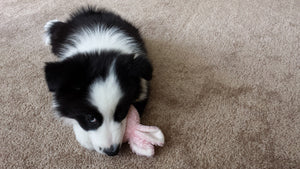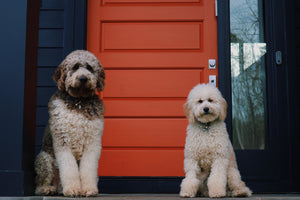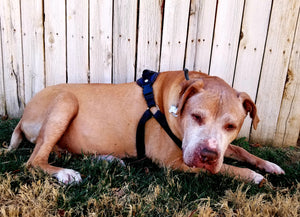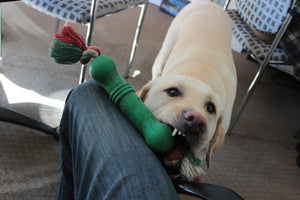Why Do Dogs Scoot (And How to Treat It)
Whether you think it’s unsanitary or just plain old embarrassing, no one wants to see their dog dragging their butt on the ground, more so when it is indoors and on your brand new carpet.
But before you get mad at your pup, there is an important reason for your dog’s "scooting.” Normal itching is one good reason, but if the scooting is frequent and accompanied by excessive scratching or biting at their butt, then there might be a more serious cause.
Your dog scoots to alleviate discomfort, which may be caused by any of the following reasons: skin irritation, food allergies, clogged anal sacs, trauma to anal sacs, or intestinal parasites.

Skin Irritation
A groomed dog is a happy and healthy one, but a good that is groomed too much can experience skin irritation. Dogs that need frequent grooming, like cocker spaniels and poodles, often experience clipper burns. Their skin can also become inflamed due to ingredients in your groomer’s products, like perfumes and sulfates.
Whatever the cause, the skin irritations can gather under your dog’s tail, causing them to scoot to relieve the discomfort.
If your dog is itchy all over, then it is your groomer’s products that are causing the irritation. Ask them about switching over to oatmeal-based, hypoallergenic, sensitive skin, or organic products. Or you can provide your own for your groomer to use. You can also check your dog’s butt for razor burns and tiny nicks. If you find any, a warm compress can help cure the irritation. See what you can give your dog for pain for some more options.
Food Allergies
Food allergies or intolerances can also cause inflammation in the anal area. A diet lacking in protein or fiber or featuring too much grain or soy can cause disruptions to your dog’s bowel movements, which can lead to irritation.
Not going to the bathroom frequently enough causes as much discomfort to dogs as it does to humans. If you notice that your dog is not going to the bathroom as much, then talk to your vet about what can be done to improve your dog’s diet.

Clogged Anal Sacs
If you didn’t know, dogs have two important glands on their butt that secret a smelly liquid when they go to the bathroom. This is a part of how dogs “mark their territory.”
However, these sacs can become inflamed, which can prevent the foul-smelling liquid from releasing. This can cause severe discomfort for your dog, which they will try to treat by rubbing the sacs against their floor. If left untreated, clogged anal sacs can lead to severe pain and infection.
You typically look at your dog’s butt to know if their anal sacs are inflamed. But if your dog is constantly scooting or showing other signs of being in pain, then take them to the vet. Your vet will provide antibiotics that will reduce the swelling and cure any infections.
Neurological Irregularities
Some dogs develop neurological problems that contribute to excessive grooming or scooting across the floor. This is common in dogs who chase their tail or have a lot of anxiety. It's best to check with your veterinarian if you think there may be neurological factors contributing to your dog's scooting.
You can help sooth your dog's anxiety by providing them with lots of interactive dog toys to play with while you're away. Installing a pet door is another great way to provide your dog access to run around in the yard whenever they please.
The Endura Flap Door Mount is a popular option among pet owners. It's great for keeping your home insulated and it's built to last a lifetime. The ability to come and go freely can reduce anxiety for many dogs and give them a healthy outlet to get their kicks out. This can help prevent your dog from scooting if the root cause is anxiety.
Trauma to the Anal Sacs
While groomers have been trained to not needlessly express the anal glands while doing their jobs, some groomers may still accidentally inflict trauma onto them. Anal sacs are delicate, and too much manual manipulation can cause inflammation and tissue damage, which can prevent the glands from working properly.
Groomers are often your full line of defense when looking for unusual growths around your dog’s anal area, so preventing them from expressing the glands entirely is not the best path to take. Instead, remind them to only do so as necessary and take your dog to the vet for treatment.
Intestinal Parasites
Another cause for your dog’s dragging their butt on the ground is intestinal parasites like tapeworms. Parasites like these often enter your dog’s body after your dog ingests fleas carrying immature larvae. When a tapeworm is fully mature, it can cause irritation around your dog’s butt.
To tell if your dog has tapeworm, check for excessive itching and rice-like segments of worm around your dog’s butt and in their feces. At the first sign of parasites, take your dog to the vet immediately.
Your dog can be cured with dewormer easily, but if left untreated, intestinal parasites can be deadly.
Dog scoot can have many causes. If you are ever unsure about the state of your dog’s health, then please take them to the vet for treatment as soon as possible.





